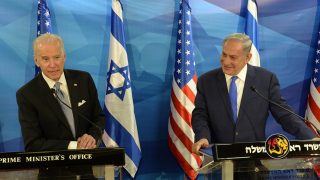
by Emmitt Barry, Worthy News Correspondent
(Worthy News)—In an address delivered to the Knesset on Monday, Israeli Prime Minister Benjamin Netanyahu remarked that the guidance from outgoing U.S. President Joe Biden on dealing with Iran and its terrorist proxies in the region was often misguided. Despite pressure from the Biden administration, Netanyahu asserted that Israel had decided to “follow our own view.”
Meanwhile, Netanyahu has repeatedly stated that he and President-Elect Donald Trump see “eye-to-eye” on the threat of Iran.
During a meeting with the Knesset Foreign Affairs and Defense Committee on Monday, Netanyahu stated that Israel will reassess its capabilities to counteract Iran following the inauguration of the new U.S. administration.
“Our ability to act against these three threats will be evaluated in the near future together with the incoming administration in Washington,” said Netanyahu.
Netanyahu strongly criticized the Biden administration for its opposition to the use of ground troops to eliminate Hamas in Gaza.
According to the premiere, the Biden administration also advised against operations in Gaza City, particularly at the Hamas-controlled Shifa Hospital and in the southern Strip strongholds of Khan Younis and Rafah.
Netanyahu recounted, “Regarding Rafah, Biden said that if Jerusalem went in, it would stand alone. He also said he would stop important arms shipments. And so he did. A few days later, [U.S. Secretary of State Antony] Blinken appeared and repeated the same things. In a broad forum, I told him: ‘Tony, if we have to, we’ll fight with our fingernails.'”
Netanyahu criticized U.S. advice following Iran’s drone and missile attacks on Israel, stating, “Again, we were told by our friend that there is no need to respond. And I said that sitting and not reacting is not acceptable, and we responded.”
Netanyahu also stated that Israel would need to maintain military operations against Hezbollah, the Iran-backed Lebanese terror group, regardless of any ceasefire agreement that might be reached in Lebanon.
“The most important thing is not [the deal that] will be laid on paper,” Netanyahu remarked. “Even if there is a paper [setting out an agreement], worthy though it may be, we will be required, in order to ensure our security in the north (of Israel), to systematically carry out operations — not only against Hezbollah’s attacks, which could come. Even if there is a ceasefire, nobody can guarantee it will hold. So it’s not only our reaction, a preventive reaction, a reaction in the wake of attack, but also the capacity to prevent Hezbollah from strengthening.”
“We will not allow Hezbollah to return to the state it was in on October 6, 2023,” he emphasized.
U.S. envoy Amos Hochstein arrived in Beirut on Monday for talks, as Hezbollah reportedly responded favorably to a U.S. ceasefire proposal.
Despite ceasefire talks, Hezbollah continued its rocket barrages on Monday, launching over 75 rockets into Israel, which resulted in one fatality and injuring 56 people, including 18 children. Debris from intercepted missiles also ignited fires and caused significant damage to buildings and vehicles in central Israel.
Copyright 1999-2025 Worthy News. This article was originally published on Worthy News and was reproduced with permission.
